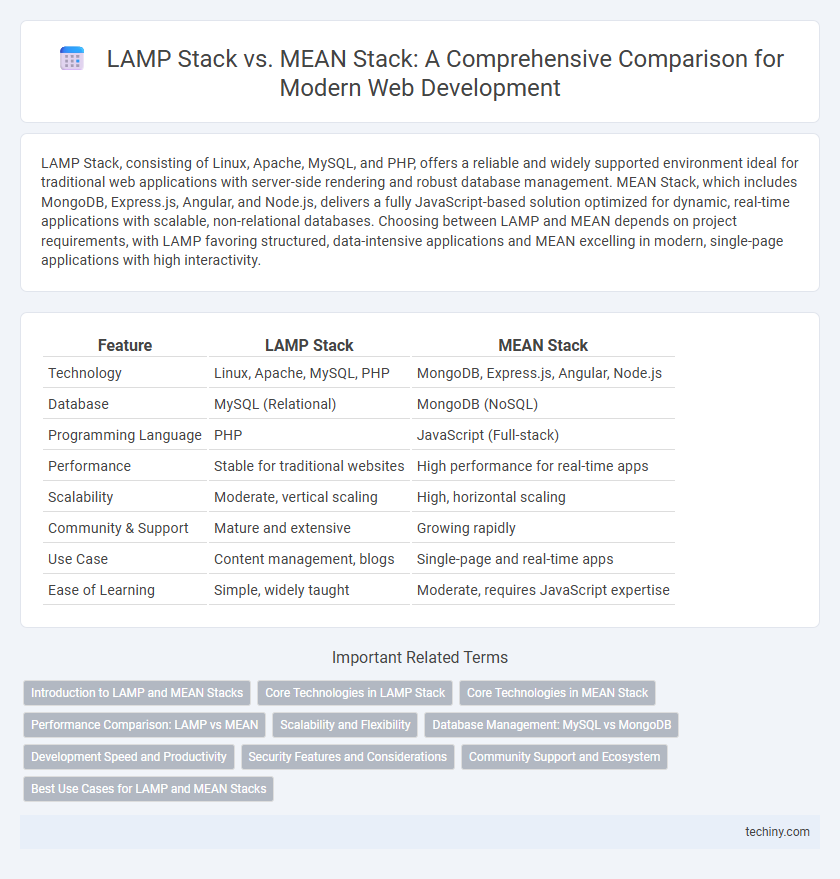LAMP Stack, consisting of Linux, Apache, MySQL, and PHP, offers a reliable and widely supported environment ideal for traditional web applications with server-side rendering and robust database management. MEAN Stack, which includes MongoDB, Express.js, Angular, and Node.js, delivers a fully JavaScript-based solution optimized for dynamic, real-time applications with scalable, non-relational databases. Choosing between LAMP and MEAN depends on project requirements, with LAMP favoring structured, data-intensive applications and MEAN excelling in modern, single-page applications with high interactivity.
Table of Comparison
| Feature | LAMP Stack | MEAN Stack |
|---|---|---|
| Technology | Linux, Apache, MySQL, PHP | MongoDB, Express.js, Angular, Node.js |
| Database | MySQL (Relational) | MongoDB (NoSQL) |
| Programming Language | PHP | JavaScript (Full-stack) |
| Performance | Stable for traditional websites | High performance for real-time apps |
| Scalability | Moderate, vertical scaling | High, horizontal scaling |
| Community & Support | Mature and extensive | Growing rapidly |
| Use Case | Content management, blogs | Single-page and real-time apps |
| Ease of Learning | Simple, widely taught | Moderate, requires JavaScript expertise |
Introduction to LAMP and MEAN Stacks
The LAMP stack consists of Linux, Apache, MySQL, and PHP, forming a traditional open-source web development platform known for stability and ease of deployment. The MEAN stack includes MongoDB, Express.js, Angular, and Node.js, offering a full JavaScript environment tailored for building dynamic and scalable applications. Both stacks serve distinct development needs: LAMP excels in straightforward, server-side projects, while MEAN supports modern, single-page applications with real-time capabilities.
Core Technologies in LAMP Stack
The LAMP stack consists of Linux as the operating system, Apache as the web server, MySQL as the relational database, and PHP as the server-side scripting language, providing a stable and widely supported foundation for web development. Each component is open-source, allowing developers to customize and optimize their applications for performance and scalability effectively. This combination excels in handling dynamic content and integrates seamlessly with various frameworks and content management systems.
Core Technologies in MEAN Stack
The MEAN Stack consists of MongoDB, Express.js, Angular, and Node.js, forming a full JavaScript-based development environment ideal for building dynamic web applications. MongoDB provides a scalable NoSQL database, while Express.js serves as a minimalistic web application framework for Node.js. Angular handles front-end development with a robust framework for single-page applications, and Node.js enables server-side JavaScript execution, enhancing performance and scalability.
Performance Comparison: LAMP vs MEAN
MEAN stack leverages JavaScript across the entire development process, enabling faster execution and improved scalability due to Node.js's non-blocking architecture. LAMP stack, relying on a combination of Linux, Apache, MySQL, and PHP, often delivers reliable performance but may experience slower response times under high concurrency because of its synchronous request handling. Benchmark tests frequently show MEAN stack outperforming LAMP in real-time applications where rapid data exchange and asynchronous processing are critical.
Scalability and Flexibility
LAMP Stack offers proven stability with components like Linux, Apache, MySQL, and PHP, providing reliable scalability for traditional web applications, but it may require additional configuration for microservices architecture. MEAN Stack, using MongoDB, Express.js, Angular, and Node.js, excels in flexibility and horizontal scalability, enabling rapid development and real-time features for modern, single-page applications. Developers prioritize MEAN Stack for dynamic, scalable projects, while LAMP remains strong for content-driven, server-rendered websites.
Database Management: MySQL vs MongoDB
MySQL is a relational database management system used in the LAMP stack, offering structured data storage with ACID compliance and support for complex SQL queries. MongoDB, integral to the MEAN stack, provides a NoSQL document-oriented database that excels in handling unstructured data with flexible schema design and horizontal scalability. Choosing MySQL favors transactional consistency and relational integrity, while MongoDB optimizes for high availability and rapid development with JSON-like BSON storage.
Development Speed and Productivity
LAMP Stack, comprising Linux, Apache, MySQL, and PHP, offers stability and ease of deployment, making it ideal for projects with well-defined requirements and a preference for server-side scripting. MEAN Stack, featuring MongoDB, Express.js, Angular, and Node.js, accelerates development speed by enabling full-stack JavaScript coding, which streamlines workflows and enhances real-time data handling. Developers often choose MEAN for agile environments due to its scalability and rapid prototyping capabilities, while LAMP remains favored for mature, resource-efficient applications.
Security Features and Considerations
LAMP Stack, comprising Linux, Apache, MySQL, and PHP, offers mature security modules like SELinux and AppArmor for Linux, robust Apache access controls, and mature, battle-tested SQL injection defenses in MySQL. MEAN Stack, consisting of MongoDB, Express.js, Angular, and Node.js, leverages JSON web tokens (JWT) for stateless authentication, built-in protection against cross-site scripting (XSS) in Angular, and role-based access control mechanisms in Node.js applications. Choosing between LAMP and MEAN requires evaluating the security demands of your application, including real-time data handling needs and the preferred ecosystem's vulnerability management.
Community Support and Ecosystem
LAMP Stack benefits from a mature and extensive community with decades of support, offering a vast ecosystem of libraries, tools, and tutorials primarily centered around Linux, Apache, MySQL, and PHP. MEAN Stack leverages a rapidly growing, active community driven by JavaScript developers, featuring a cohesive ecosystem that integrates MongoDB, Express.js, Angular, and Node.js for full-stack JavaScript development. The strong community contributions for MEAN enable faster innovation and modern web development practices, while LAMP's long-standing ecosystem ensures stability and extensive legacy support.
Best Use Cases for LAMP and MEAN Stacks
LAMP Stack excels in building stable, scalable web applications with a focus on server-side rendering, making it ideal for traditional content management systems, blogs, and legacy applications requiring robust PHP and MySQL integration. MEAN Stack leverages MongoDB, Express.js, Angular, and Node.js to support dynamic, real-time single-page applications (SPAs) and microservices architectures, favored for modern web apps that demand high interactivity and seamless JSON data handling. Choosing between LAMP and MEAN depends on project requirements: LAMP suits projects needing mature tooling and relational databases, while MEAN offers a full JavaScript environment optimized for speedy development and scalable cloud deployments.
LAMP Stack vs MEAN Stack Infographic

 techiny.com
techiny.com